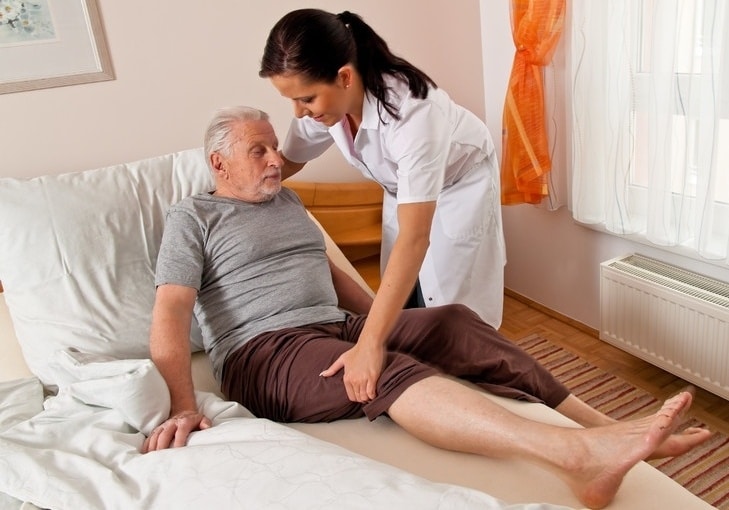Care for Nurses with Chronic Venous Insufficiency

It can hurt to care--just ask any nurse.
As a profession, nurses experience some of the highest rates of varicose veins and Chronic Venous Insufficiency (CVI) in the country. In fact, in one study by the NIH, 63 per cent of participating nurses were shown to have at least one sign of CVI.
Nurses will know that it is important to diligently practice self-care in order to minimize the discomfort of this condition. Elevating the legs, compression stockings, and engaging in calf muscle-contracting exercises such as walking are just some of the home care remedies that can provide occasional relief. As a chronic and progressive condition, the pain, fatigue and other symptoms caused by CVI are likely to worsen.
Fortunately, there are other minimally invasive treatment options that can bring relief from the pain of CVI and varicose veins. If you live and work with any of these symptoms , consider consulting a qualified vein specialist soon to ensure your vascular health is not at risk, and to learn about a treatment plan that is tailored for you.
In the meantime, compression stockings helps if you stand or sit for long periods of time. However, be careful with calf sleeves as they can sometimes cause swelling in the feet because they typically end at the ankle.
CVI risk factors for nurses
There are a number of reasons why nurses are at particular risk for development and progression of CVI. The first reason is their job requires that they stand for long periods; basically, gravity takes its toll. Activities that require standing (or even sitting) for extended periods deprive the body of the benefits of the strong calf muscle contractions produced while walking. This means the heart has to work a lot harder to push the blood through the legs and back up for reoxygenation and recirculation. Over time, the vascular system wearies and becomes less efficient.
The physical strain of the occupation is another notable contributor to the development of CVI. Nurses work long hours, carry out very physical labor, and often perform shift work. This can affect sleep and eating schedules, and these factors can have a negative effect on health, generally, leading to conditions such as insomnia and overweight.
Another factor is gender. Women dominate nursing, and estrogen, oral contraceptives and hormone replacements are known to contribute to the weakening of blood vessel walls. This stretch in blood vessels means more bulging and less efficient return of blood.
Help for nurses with CVI
The good news is that there are qualified vein specialists who care about the wellbeing of nurses. Jilanne Rose is one such specialist. As a board certified doctorate nurse practitioner, she understands the special needs of nurses. Trained by three top Arizona vein specialists-an interventional cardiologist, a cardiothoracic surgeon, and an interventional radiologist-she has completed over 10,000 peripheral vein procedures, and is known for her compassionate care and exceptional outcomes.
If you are experiencing any of the symptoms of CVI, consider consulting with Jilanne today to find out how she can have you back on your feet and doing the work you love, more comfortably, in remarkably little time.
Question: What can a venous reflux exam tell me? How does this treatment measure my veins effectiveness?
Read MoreQuestion: How long does the actual varicose vein surgery itself take and how much time should I expect for the recovery?
Read MorePregunta: ¿Cuáles son las mejores maneras de juzgar las calificaciones de un médico para el tratamiento de las venas? Mis venas están en forma horrible, y me dijeron recientemente que necesitaría 5 procedimientos diferentes de ablación y 6 citas de escleroterapia después. Tuve mi primer procedimiento VNUS por un médico de la vena en Gilbert…
Read MorePregunta: tuve mis inyecciones (escleroterapia) hace 3 semanas (no en el Instituto de vena avanzada de Arizona). Mi tobillo todavía está terriblemente hinchado. He vuelto dos veces para una ecografía y ningún coágulo. ¿Cuánto dura la hinchazón normalmente? Yo camino y no usar mis medias como se indica. Me está disuadiendo de continuar el tratamiento,…
Read MoreQuestion: What are the best ways to judge a doctor’s qualifications for vein treatment? My veins are in horrible shape, and I was recently told that I would need 5 different ablation procedures and 6 Sclerotherapy appointments afterwards. I had my first VNUS procedure by a vein doctor in Gilbert on the greater saphenous vein, and…
Read MoreQuestion: I had my injections (Sclerotherapy) done 3 weeks ago (not at Advanced Vein Institute of Arizona). My ankle is still terribly swollen. I’ve been back twice for an ultrasound and no clot. How long does the swelling normally last? I walk and did wear my stockings as directed. It is deterring me from continuing treatment…
Read MorePregunta: ¿se pueden tratar las venas normales? Así que tengo venas de color verde azulado muy largas en mi muñeca. Sé que hay normalidad pero odio cómo se ven. ¿Puedo tratarlo con escleroterapia? También tengo 2 largas venas verdes en mi pecho. ¡Ayuda! También tengo 15 años, ¿puedo pasar por la escleroterapia?
Read MoreQuestion: Can normal veins be treated? So I have normal very long green bluish color veins in my wrist. I know there normal but I hate how they look. Can I treat it with sclerotherapy? I also have 2 long green veins in my chest. Help! Also I’m 15, can I go through sclerotherapy?
Read MorePregunta: Tengo 50 años de edad; un soltero, y un maestro. En este momento tengo varices (aunque no son dolorosas) en mi pierna derecha. No estoy feliz de verlos. ¿Qué puede sugerir para disminuir su visibilidad?
Read MoreQuestion: What is “extensive vascular calcium deposits” when shown on X-rays?
Read More